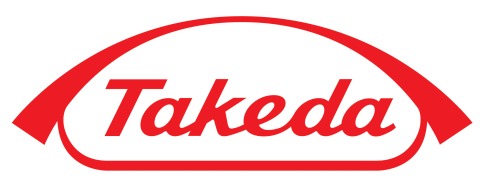
Osaka, Japan & New York, United States:
− Ovid eligible to receive up to $856M in payments, including a $196M upfront payment, regulatory and commercial milestone payments and tiered double-digit royalties on product sales
− Potential first-in-class therapy reduced seizure frequency in children with Dravet syndrome and Lennox-Gastaut syndrome in Phase 2 ELEKTRA study
− Original 2017 collaboration between Ovid and Takeda to conclude; Ovid will have no further development or milestone obligations
− Takeda plans to initiate Phase 3 studies in children and adults with Dravet syndrome and Lennox-Gastaut syndrome in calendar year Q2 2021
− Ovid will hold a conference call and webcast today at 8:30 a.m. EST
Takeda Pharmaceutical Company Limited (TSE:4502/NYSE:TAK) (“Takeda”) and Ovid Therapeutics Inc. (NASDAQ: OVID) (“Ovid”), a biopharmaceutical company committed to developing medicines that transform the lives of people with rare neurological diseases, today announced that Takeda has entered into an exclusive agreement under which Takeda will secure global rights at closing from Ovid to develop and commercialize the investigational medicine soticlestat (TAK-935/OV935) for the treatment of developmental and epileptic encephalopathies, including Dravet syndrome (DS) and Lennox-Gastaut syndrome (LGS).
Discovered at Takeda’s Shonan, Japan research center, soticlestat is a potent, highly selective, first-in-class inhibitor of the enzyme cholesterol 24-hydroxylase (CH24H). Under the new exclusive agreement, all global rights to soticlestat have been secured by Takeda from Ovid. Takeda will assume sole responsibility for further worldwide development and commercialization, and Ovid will no longer have any financial obligation to Takeda under the original collaboration agreement, including for milestone payments or any future development and commercialization costs. Ovid will receive an upfront payment of $196 million at closing and is eligible to receive up to an additional $660 million upon achieving development, regulatory and sales milestones. In addition, Ovid will receive tiered royalties beginning in the low double-digits and up to 20 percent on sales of soticlestat, if approved and commercialized. The new agreement is expected to close by end of March 2021, subject to the satisfaction of customary closing conditions, including review by the appropriate regulatory agencies under the Hart-Scott-Rodino Act.
“I would like to thank Ovid for their thoughtful and productive collaboration. Together we generated positive Phase 2 ELEKTRA study data, and as a result, soticlestat is poised to enter two pivotal trials,” said Andy Plump, M.D., Ph.D., President of Research and Development at Takeda. “Our work together demonstrates the strength of Takeda’s partnership model and our commitment to delivering transformative medicines to patients with neurological diseases.”
Under the 2017 collaboration agreement, Takeda received equity in Ovid and was eligible to receive up to $85 million in payments for regulatory milestones, including the initiation of Phase 3 clinical trials. Ovid led global development of soticlestat through the successful demonstration of proof-of-concept in multiple rare epilepsies.
“This new agreement is a positive outcome for patients, for Ovid and for Takeda. Jointly, we have set the stage, optimized the program and enabled it to accelerate,” said Jeremy Levin, DPhil, MB, BChir, Chairman and Chief Executive Officer of Ovid Therapeutics. “Ovid may benefit significantly, but without the obligation to commit the substantial capital needed over the coming years as soticlestat completes pivotal trials and, if successful, enters the global market. Importantly, with the resources this agreement delivers, Ovid is strategically and financially positioned well into the future. We will advance and enrich our pipeline while continuing to build a leading company in rare diseases of the brain. We would like to thank Takeda, who has been a superb partner, and we look forward to further successes for this program in the future.”
“Soticlestat has emerged as an important late-stage molecule in our portfolio, which focuses predominantly on rare neurological and neuromuscular diseases with great unmet need,” said Sarah Sheikh, M.D., M.Sc., MRCP, Head, Neuroscience Therapeutic Area Unit at Takeda. “We are working diligently and expediently to initiate and execute upon the Phase 3 studies in children and young adults with DS and LGS. Our goal is to one day bring new treatment options that provide greater seizure control, tolerability and function to DS and LGS patients around the world.”
Advancing New Treatment Options for DS and LGS Patients
Takeda and Ovid reported results from the Phase 2 ELEKTRA study in August 2020, in which soticlestat met its primary endpoint of reducing seizure frequency in pediatric patients with DS or LGS. Takeda intends to initiate Phase 3 studies of soticlestat in children and young adults with DS and LGS in calendar year Q2 2021.
About Soticlestat (TAK-935/OV935)
Soticlestat is a potent, highly selective, first-in-class inhibitor of the enzyme cholesterol 24-hydroxylase (CH24H), with the potential to reduce seizure susceptibility and improve seizure control. CH24H is predominantly expressed in the brain, where it converts cholesterol into 24S-hydroxycholesterol (24HC) to adjust the homeostatic balance of brain cholesterol. 24HC is a positive allosteric modulator of the NMDA receptor and modulates glutamatergic signaling associated with epilepsy. Glutamate is one of the main neurotransmitters in the brain and has been shown to play a role in the initiation and spread of seizure activity. Recent literature indicates that CH24H is involved in over-activation of the glutamatergic pathway through modulation of the NMDA channel and that increased expression of CH24H can disrupt the reuptake of glutamate by astrocytes, resulting in epileptogenesis and neurotoxicity. Inhibition of CH24H by soticlestat reduces the neuronal levels of 24HC and may improve distorted excitatory/inhibitory balance in the brain.
About Dravet Syndrome and Lennox-Gastaut Syndrome
Dravet syndrome and Lennox-Gastaut syndrome are types of developmental and epileptic encephalopathies (DEEs), a heterogeneous group of rare epilepsy syndromes. Dravet and Lennox-Gastaut syndrome typically become apparent during infancy or early childhood and are highly refractory to many antiseizure medications.
Dravet syndrome is most commonly caused by a genetic mutation in the SCN1A gene and affects approximately 1 in 15,000 to 1 in 21,000 people in the United States. Dravet syndrome is characterized by prolonged focal seizures that can evolve to convulsive tonic-clonic seizures. Children with Dravet syndrome experience developmental disabilities as seizures increase. Other common symptoms include changes in appetite, difficulty balancing and a crouched gait when walking.
Lennox-Gastaut syndrome is estimated to affect approximately 1 in 11,000 people in the United States. Lennox-Gastaut syndrome is a heterogeneous condition and characterized by several different types of seizures, most commonly atonic (drop), tonic and atypical absence seizures. Children with Lennox-Gastaut syndrome may also develop cognitive dysfunction, delays in reaching developmental milestones and behavioral problems. Lennox-Gastaut syndrome can be caused by a variety of underlying conditions, but in some cases no cause can be identified.
Ovid Conference Call and Webcast Information
Ovid Therapeutics will host a conference call beginning today, March 3rd at 8:30 AM Eastern Time. The live event will be available on the investor page of the Ovid Therapeutics website at investors.ovidrx.com or by dialing (866) 830-1640 (domestic) or (210) 874-7820 (international) and referencing conference ID number 6343028. A replay of the call will be available on the Ovid Therapeutics website following the completion of the call and will be archived for 30 days.
Disclaimer: This content is distributed by Business Wire India.


